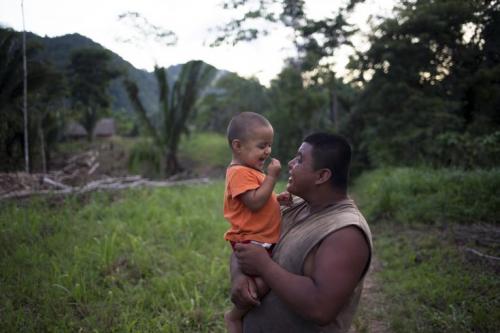UNICEF and H&M Foundation launch a new interactive online tool to help fathers learn ‘baby talk’
A new, free, interactive online tool to encourage fathers to talk more to their babies – and learn the most effective methods in doing so – has launched on October 11, 2018.

Two-year-old Abner laughs while being carried by his father, James Choc, in San Felipe Village in Belize, August 2016.
The Baby Talk for Dads online tool – developed by UNICEF and H&M Foundation, in collaboration with Dr. Marina Kalashnikova – forms part of the organizations’ longstanding commitment to supporting healthy brain development in babies and young children.
The first of its kind product – available on computers and mobile devices – takes fathers on a journey whereby they can learn and practice the most effective tone and pitch for when talking with their babies.
Baby Talk for Dads also provides an easy-to-digest, scientific-based overview on how talking to babies in melodic, exaggerated sounds stimulates learning and development.
During early childhood, the human brain develops faster than at any other period, creating new neural connections at optimal speed. These connections form through interactions between genes and a baby’s environment and experiences, and create the architecture of a child’s brain – which all present and future learning, behavior and health depend on.
”Healthy brain development during the early years of life is reliant upon responsive interactions and stimulating experiences, along with good nutrition and protection – and it is parents who hold the biggest stake in providing this environment,” said UNICEF Chief of Early Childhood Development Dr. Pia Britto. ”We hope that this innovative tool helps inspire fathers and all caregivers to talk more with their babies.”
Evidence suggests that when babies hear slow, melodic, and exaggerated sounds it helps them develop fast cognitively and learn new words more efficiently. Some studies have revealed that when babies are spoken to in high-pitched baby talk from their caregivers they can speak earlier and have a larger vocabulary than babies who have not been interacted with in the same way.
Two-way conversations with babies, using eye contact, mirroring expressions and responding to cues are equally as important to vocal sounds in supporting healthy brain development in babies.
Baby Talk for Dads consists of three playful voice exercises caregivers can do with or without their child. Each exercise was developed using the expertise of researcher Dr. Marina Kalashnikova from the Basque Center on Cognition, Brain and Language.
“When we talk to our babies from the earliest moments of life – particularly in melodic, high-pitched, and exaggerated tones – we have a profound impact on their cognitive development,” said Dr. Marina Kalashnikova. “In our research we’ve seen marked differences in the early development of babies who have experienced responsive baby talk with their caregivers and other family members around them, to those that haven’t.”
The initiative is part of a global programme on early childhood development that was launched by UNICEF and H&M Foundation in 2014. It has so far reached more than 135,000 children around the world.
“Baby talk may sound silly to us, but not to your child. It actually helps develop their brain. But as it turns out, dads don’t speak baby talk as much as mums do. We have developed this tool to support dads in becoming fluent in ‘baby talk’. It’s a fun and easy tool to highlight a very important issue,” said Diana Amini, Global Manager, H&M Foundation.
Source:United Nations Children's Fund
- 297 reads
Human Rights
Fostering a More Humane World: The 28th Eurasian Economic Summi

Conscience, Hope, and Action: Keys to Global Peace and Sustainability

Ringing FOWPAL’s Peace Bell for the World:Nobel Peace Prize Laureates’ Visions and Actions

Protecting the World’s Cultural Diversity for a Sustainable Future

Puppet Show I International Friendship Day 2020

